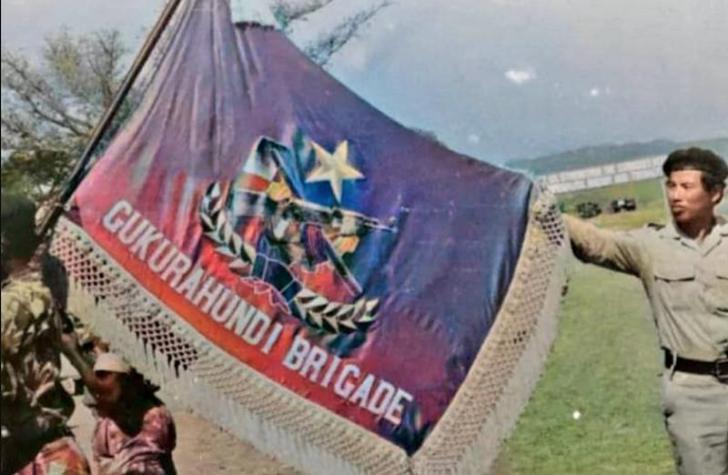News / Local
Zanu-PF ignores Gukurahundi cries
03 Nov 2024 at 10:19hrs |
0 Views

Critics have voiced strong concerns regarding the ruling Zanu-PF party's failure to adopt a resolution addressing the Gukurahundi atrocities during its recent annual conference held in Bulawayo. The lack of a decisive stance on the mass killings of the 1980s has been interpreted as a sign of insufficient political will to seek closure for the survivors and families affected by the violence.
During the conference, President Emmerson Mnangagwa acknowledged Gukurahundi in his speech, but critics had hoped for a more substantive resolution to address this sensitive and emotive issue. Many surviving victims of the Gukurahundi massacres are now aging, and there have been calls for compensation and recognition of their suffering.
The consensus among critics is that without genuine acknowledgment and accountability, healing for the affected communities remains elusive. The silence from Zanu-PF suggests a deeper unwillingness to confront the painful realities faced by many Zimbabweans, particularly those in the Matabeleland region. The absence of progress on a promised outreach program led by local chiefs further exacerbates concerns about the sincerity of the ruling party's efforts to reconcile the past.
Mbuso Fuzwayo, secretary-general of the human rights organization Ibhetshu LikaZulu, expressed disappointment at Zanu-PF's stance. "Gukurahundi is a priority to them because, as an organization, the official position we have heard is that Gukurahundi was resolved by the late President Robert Mugabe and the late Vice President Joshua Nkomo when they signed the Unity Accord in 1987," he stated. Fuzwayo emphasized that the ongoing silence from the ruling party signals that Gukurahundi remains a low priority.
Zapu spokesperson Richard Gandari echoed these sentiments, expressing disappointment with the conference resolutions, which he claimed primarily focused on Zanu-PF's power retention agenda. "That is why we had to endure the gory spectacle of a whole conference staged only to solidify Zanu-PF's factional ED2030 agenda," he said. Gandari also lamented the conference's silence on the chiefs-led Gukurahundi outreach program that was launched by Mnangagwa in July.
Bulawayo-based human rights activist and political commentator Effie Ncube remarked that Gukurahundi should not be politicized. "A party resolution on addressing the Gukurahundi atrocities would have turned the emotive subject into a party programme, making it difficult to achieve the much-needed cross-cutting consensus," he noted. Ncube emphasized that any mechanisms for addressing Gukurahundi must be credible, victim-centered, and insulated from political agendas.
The specter of Gukurahundi continues to loom large over Zimbabwean politics, and Mnangagwa's reputation is closely tied to this dark chapter in the country's history. As calls for justice and closure grow louder, many are left questioning the ruling party's commitment to addressing the past and fostering a reconciled future.
During the conference, President Emmerson Mnangagwa acknowledged Gukurahundi in his speech, but critics had hoped for a more substantive resolution to address this sensitive and emotive issue. Many surviving victims of the Gukurahundi massacres are now aging, and there have been calls for compensation and recognition of their suffering.
The consensus among critics is that without genuine acknowledgment and accountability, healing for the affected communities remains elusive. The silence from Zanu-PF suggests a deeper unwillingness to confront the painful realities faced by many Zimbabweans, particularly those in the Matabeleland region. The absence of progress on a promised outreach program led by local chiefs further exacerbates concerns about the sincerity of the ruling party's efforts to reconcile the past.
Mbuso Fuzwayo, secretary-general of the human rights organization Ibhetshu LikaZulu, expressed disappointment at Zanu-PF's stance. "Gukurahundi is a priority to them because, as an organization, the official position we have heard is that Gukurahundi was resolved by the late President Robert Mugabe and the late Vice President Joshua Nkomo when they signed the Unity Accord in 1987," he stated. Fuzwayo emphasized that the ongoing silence from the ruling party signals that Gukurahundi remains a low priority.
Zapu spokesperson Richard Gandari echoed these sentiments, expressing disappointment with the conference resolutions, which he claimed primarily focused on Zanu-PF's power retention agenda. "That is why we had to endure the gory spectacle of a whole conference staged only to solidify Zanu-PF's factional ED2030 agenda," he said. Gandari also lamented the conference's silence on the chiefs-led Gukurahundi outreach program that was launched by Mnangagwa in July.
Bulawayo-based human rights activist and political commentator Effie Ncube remarked that Gukurahundi should not be politicized. "A party resolution on addressing the Gukurahundi atrocities would have turned the emotive subject into a party programme, making it difficult to achieve the much-needed cross-cutting consensus," he noted. Ncube emphasized that any mechanisms for addressing Gukurahundi must be credible, victim-centered, and insulated from political agendas.
The specter of Gukurahundi continues to loom large over Zimbabwean politics, and Mnangagwa's reputation is closely tied to this dark chapter in the country's history. As calls for justice and closure grow louder, many are left questioning the ruling party's commitment to addressing the past and fostering a reconciled future.
Source - the standard
Join the discussion
Loading comments…


































